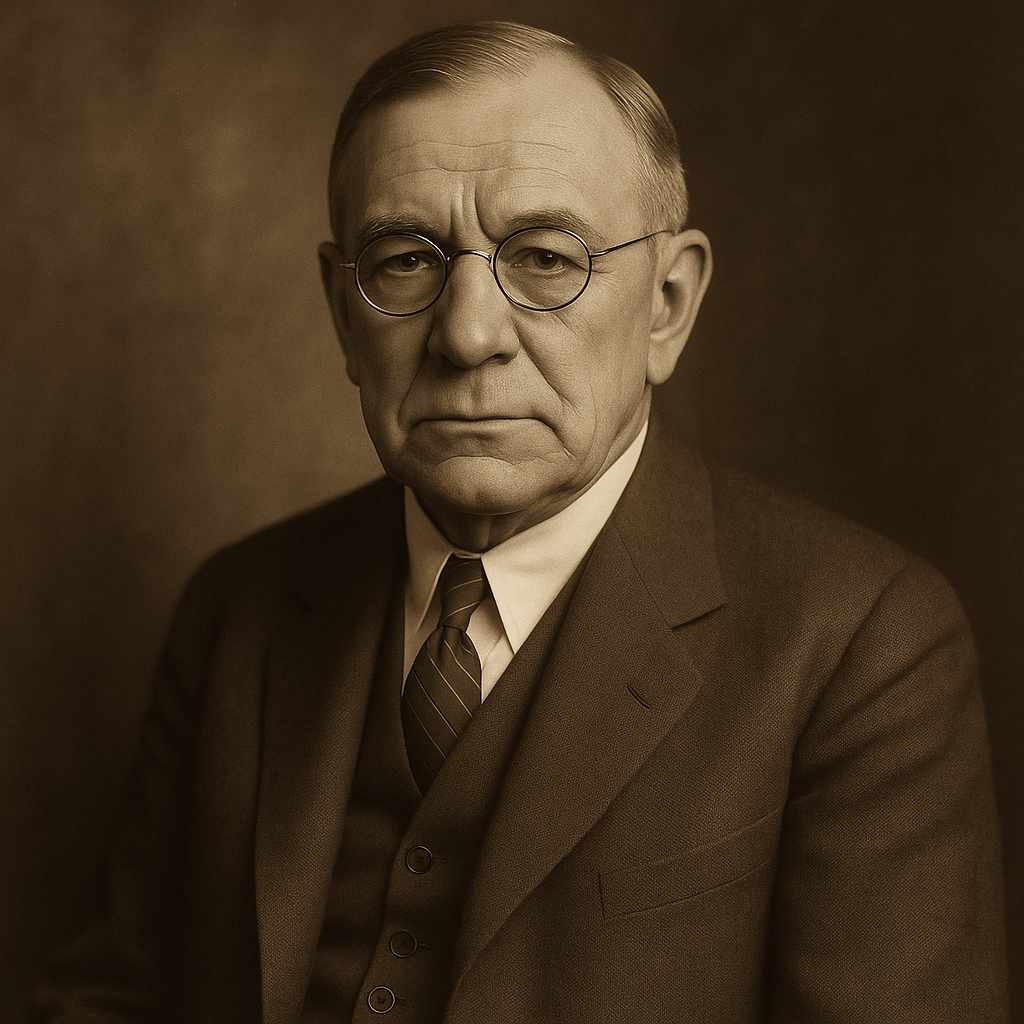2 Poems by Edgar A. Guest
1881 - 1959
Edgar A. Guest Biography
Edgar Albert Guest, often celebrated as the "People's Poet," stands as a unique figure in the pantheon of American literature, whose prolific output and accessible style captured the hearts of millions during his lifetime. Born on August 20, 1881, in Birmingham, England, Guest emigrated with his family to the United States in 1891. Settling in Detroit, Michigan, a city that would become synonymous with his life and work, Guest's early years were shaped by economic struggles, the upheaval of immigration, and the resilience of a family striving to carve out a better life.
Guest’s literary journey began modestly, deeply entwined with his career in journalism. At the age of 13, he left school to work as a copyboy for the Detroit Free Press, a job that would serve as both a livelihood and a foundation for his future success. In 1898, Guest published his first poem in the newspaper, marking the beginning of a career that would span over six decades and see the publication of over 11,000 poems. His early verse resonated with readers, reflecting the values, aspirations, and struggles of everyday life in a manner that was deeply relatable.
The appeal of Edgar Guest’s poetry lay in its simplicity and sincerity. Writing in plain, straightforward language, he eschewed the complex metaphors and lofty abstractions of more erudite poets, instead grounding his work in the rhythms and realities of daily life. Guest's poems were homespun and optimistic, often celebrating themes such as family, work, faith, and perseverance. His words echoed the moral values of the early 20th-century American middle class, offering reassurance and inspiration during a time of rapid societal change.
Guest’s reputation as a household name was solidified through his regular newspaper column in the Detroit Free Press. Over time, this column evolved into a syndicated feature that appeared in newspapers across the United States, bringing his work to millions of readers. His poems were often short and digestible, perfect for the daily lives of his audience, and he became a trusted voice offering wisdom and comfort. In 1916, the publication of his first collection, A Heap o’ Livin’, became a bestseller, further cementing his status as America’s poet laureate of the common man.
Despite his enormous popularity, Guest's work was not without its detractors. Literary critics often dismissed his poetry as overly sentimental, simplistic, or lacking the artistic rigor of the modernist and imagist movements gaining prominence during his lifetime. Indeed, in an era marked by the experimentalism of T.S. Eliot, Ezra Pound, and Wallace Stevens, Guest’s verse appeared decidedly old-fashioned. Yet, it was precisely this traditional, unpretentious quality that endeared him to readers. His poetry served as an antidote to the alienation and complexity often associated with modernist literature, offering instead a sense of stability and universal truth.
Guest’s work was deeply rooted in the spirit of the times. The early decades of the 20th century were marked by industrialization, two World Wars, the Great Depression, and rapid social transformations. In such uncertain times, Guest’s unwavering optimism and faith in human goodness provided a beacon of hope. Poems such as “Home” and “It Couldn’t Be Done” encapsulated his ability to find beauty and meaning in the everyday, transforming mundane experiences into celebrations of resilience and joy. His words, simple yet profound, reminded readers of the enduring value of family, hard work, and faith.
A devoted family man, Guest often drew inspiration from his own domestic life. He married Nellie Crossman in 1906, and the couple raised three children together. Guest’s poetry frequently reflected his role as a husband and father, with many of his verses celebrating the joys and challenges of family life. His love for his children and wife infused his work with warmth and authenticity, making his poems feel like intimate conversations shared around the dinner table.
As his fame grew, Guest expanded his reach beyond the printed page. He became a popular speaker, traveling the country to deliver his poetry in person. His genial demeanor and conversational delivery made him a beloved figure on the lecture circuit. In the 1930s, he even hosted a radio program, further endearing him to the American public. In 1951, Guest’s popularity reached new heights when he became one of the first poets to have his own television show, A Guest in Your House, where he shared his poetry and anecdotes with a nationwide audience.
Guest’s literary output was staggering, with over 20 volumes of poetry published during his lifetime. Titles such as Just Folks (1917), The Path to Home (1919), and Faith (1932) reflected his enduring preoccupations with community, domesticity, and moral strength. His work transcended the boundaries of traditional poetry, appearing in greeting cards, advertisements, and anthologies, further solidifying his place in the cultural fabric of America.
While Guest’s style and thematic focus remained largely consistent throughout his career, his later works showed a subtle maturation. Poems like “Courage” and “Tomorrow’s Better Than Today” retained his characteristic optimism but also revealed a deeper awareness of life’s trials and complexities. This balance between hope and realism made his poetry resonate with readers of all ages and backgrounds.
Edgar Guest’s legacy is a testament to the power of accessibility and relatability in literature. Although his work has largely fallen out of favor with literary scholars, his impact on popular culture and his role as a voice for ordinary Americans cannot be overlooked. His poetry, dismissed by some as merely sentimental, was for others a source of genuine comfort and inspiration.
In reflecting on Edgar Guest’s life and career, it is essential to recognize the unique space he occupied in American letters. While he may never be counted among the canonical greats, his contributions to the cultural and emotional lives of his readers remain significant. Guest’s ability to find poetry in the everyday, to articulate the hopes and dreams of a nation, and to offer solace in times of hardship, ensured that his words would live on in the hearts of those who found strength and meaning in his verse.
Edgar Albert Guest passed away on August 5, 1959, just shy of his 78th birthday. Yet, his poetry continues to resonate with those who value its timeless celebration of life’s simple pleasures and enduring truths. For millions, he remains the quintessential “People’s Poet,” a title that speaks not only to his popularity but to his profound connection with the lives and hearts of his readers.
This text was generated by AI and is for reference only. Learn more
Username Information
No username is open
Unique usernames are free to use, but donations are always appreciated.
Quick Links
© 2024-2025 R.I.Chalmers (V2Melody).

All music on this site by R.I.Chalmers (V2Melody) is licensed under a Creative Commons Attribution-NonCommercial 4.0 International License.
Attribution Requirement:
When using this music, you must give appropriate credit by including the following statement (or equivalent) wherever the music is used or credited:
"Music by R.I.Chalmers (V2Melody) – https://v2melody.com"
Support My Work:
If you enjoy this music and would like to support future creations, donations are always welcome but never required.
Donate



